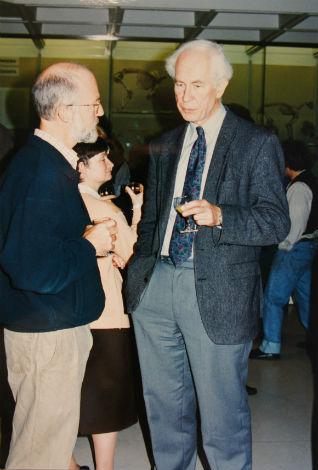
Submitted by Administrator on Fri, 04/08/2017 - 15:44
It is with great sadness that we report the death, peacefully on 1st August, of Pat Bateson. He was 79 and admired not only for his brilliant research but also for his warmth of personality, an inspiring combination and especially for generations of aspiring young scientists who were lucky to come under his spell.
In a long and highly distinguished career, he became a world leader in the field of Ethology, forging new links between behavioural development and evolution. He influenced science more widely too, both in Cambridge, as the first scientist to be elected Provost of King’s College (1988-2003), and nationally and internationally, in his roles as President of the Zoological Society of London and as Biological Secretary and Vice President of the Royal Society. He was elected FRS in 1983, and Knighted in 2003.
He spent almost all his career in Cambridge. He came to King’s College as an undergraduate in October 1957, gaining the top first in Part II Zoology in 1960. By graduation he had already published several papers, one on the cliff nesting behaviour of Ivory Gulls, studied on a student expedition to Svalbard with the encouragement of Niko Tinbergen, and another on bird migration in the Mediterranean, where he tracked autumn migrants crossing the full moon at night on their journey south to Africa. In 1960, he started a PhD, under the supervision of Robert Hinde at the newly formed Sub-Department of Animal Behaviour in Madingley, where he showed how filial imprinting enabled young chicks to learn to recognise and follow their mother and hence avoid attack by other females.
After a Harkness Fellowship at Stanford, he returned to Cambridge in 1965, first as a King’s College Research Fellow, and then as University Lecturer. He became Director of the Sub-Department at Madingley (1976-88) and in 1984 was awarded a personal Chair as Professor of Ethology. He continued work on imprinting, showing by elegant experiments with quail how sexual imprinting on siblings enabled birds to avoid mating with relatives and promote optimal outbreeding. He also enjoyed successful collaborations to explore broader issues in behavioural development, most notably with Gabriel Horn and Brian McCabe on the neural changes that take place during imprinting. His classic book “Measuring Behaviour” co-authored with his student Paul Martin is a primer not only for ethologists but also one on how to do good science.
He was a pioneer in considering animal welfare in research. As President of the Association for the Study of Animal Behaviour, he established an Ethical Committee for research guidelines and he chaired a report to the National Trust showing that the hunting of red deer by hounds was not justified on welfare grounds, which led to the Trust banning this on their land.
He will be remembered with great affection as a brilliant, generous and courageous colleague. Our thoughts, now especially, are with his wife, Dusha, and their daughters Melissa and Anna.
Nick Davies
